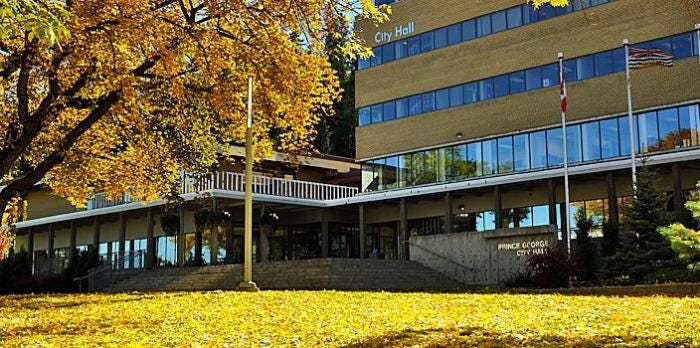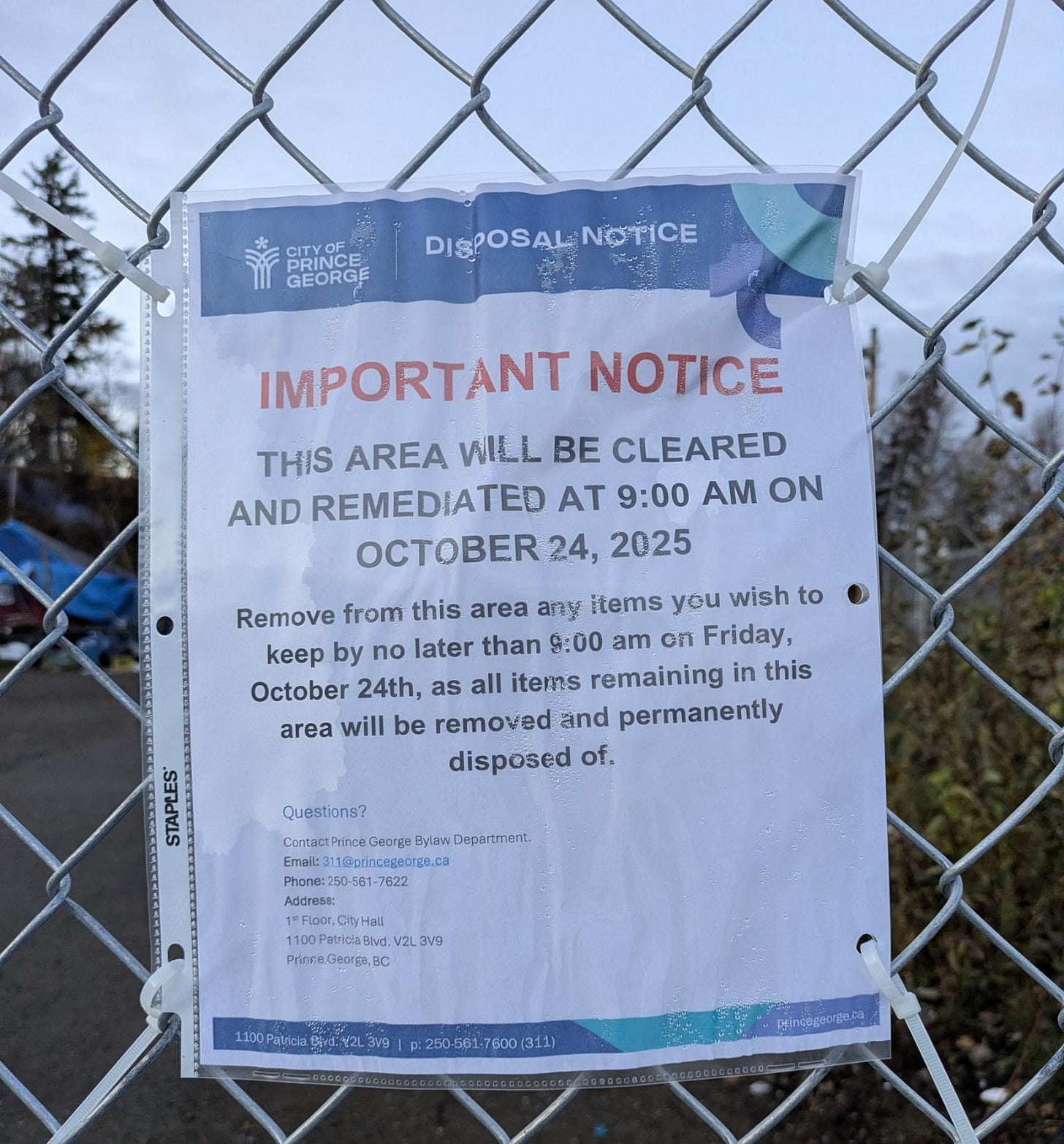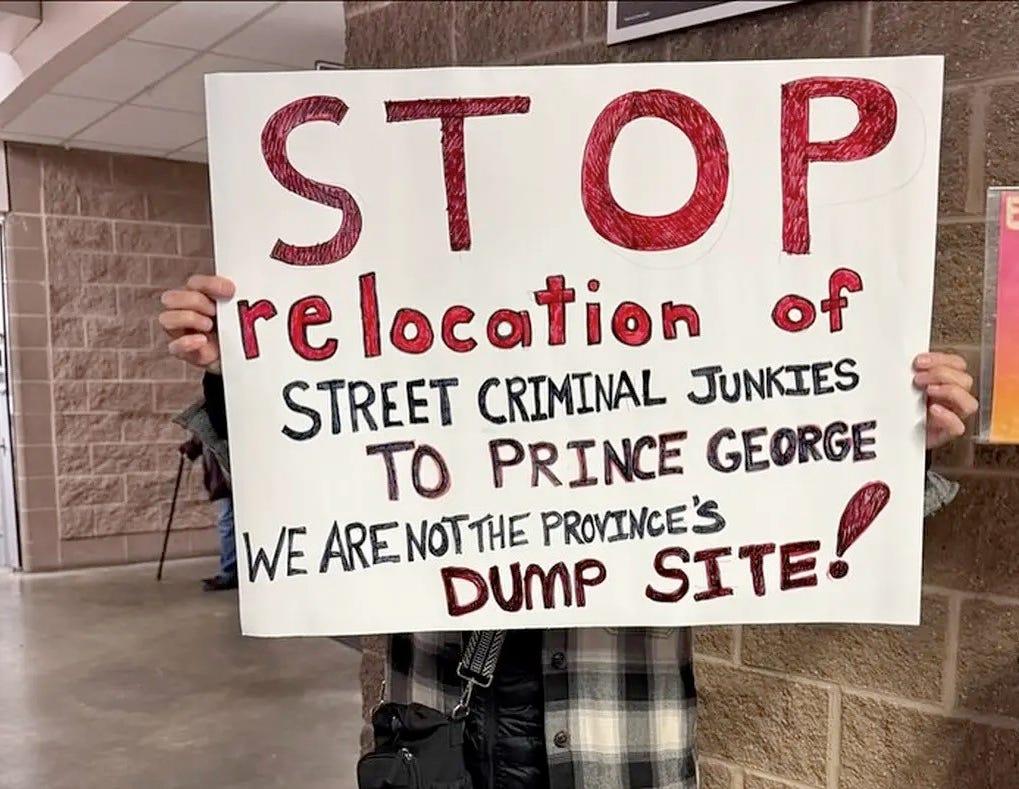Prince George prepares to displace residents of Moccasin Flats
The city apologized for the harms caused by dismantling people’s homes at Moccasin Flats in 2022. Now they plan to dismantle it again.
The city of Prince George has posted notices on the fences erected around Moccasin Flats stating they will clear the encampment today at 9:00am.
Between eight and 10 people are actively living there, according to community outreach workers. The population of Moccasin Flats has fluctuated since it was established in 2021.
The city’s plan to forcibly displace people to nowhere is part of a trend in regions across British Columbia, including in Kelowna, Vancouver, Maple Ridge and Surrey, to dismantle tent cities and displace the people who live there through coercion and force.
“They’re criminalizing homelessness,” says Moccasin Flats resident Johnny MacBurnie.
Canada’s federal housing advocate and BC’s Office of the Human Rights Commissioner are among those calling for an end to the violence of displacing people living outdoors across BC. Research conducted in Vancouver and across the US has shown that forced displacement and increased chances of overdose are connected, as is displacement with a number of other public health harms.
A 2022 report conducted by the BC Assembly of First Nations in Prince George showed many public health issues can be driven by displacement and seizures of belongings by bylaw officers in the city, including the impacts of the toxic drug crisis. The confiscation of what few belongings people had also led to injuries from the cold, such as frostbite, and forced people into “survival mode” to keep warm.
The Moccasin Flats encampment has been the focus of a number of legal battles won by the residents. But in August, the BC Supreme Court handed down an injunction that permits the city to displace the remaining people residing there.
In 2021, the city breached the legal order protecting Moccasin Flats as they dismantled much of the encampment without meeting conditions to provide adequate shelter for the people living there before taking such action. The legal order is seen as an important human rights precedent toward the decriminalization of people living outdoors during the daytime in BC.
In March 2022, Prince George issued an apology for its breach and “causing harm to vulnerable citizens.”
MacBurnie and some other residents feel the recent ruling goes in the opposite direction and criminalizes homelessness.
BC Supreme Court Justice Elwood found that although there was still a shortage of adequate housing compared to the total residents in Moccasin Flats, he deemed the city’s longer term plan to be “realistic.” Prince George called the ruling a success in a press release soon after.
Prince George had also sought a formal declaration that the Third Avenue site be considered “accessible” shelter. Justice Elwood rejected this, stating that it could risk defining people who decline to stay there for any reason as no longer homeless under the law.
Not mentioned in Justice Elwood’s ruling is that Third Avenue is “transitional.” Residents are not covered by the tenancy rights embedded in BC’s Residential Tenancy Act in transitional units—this means people can (and are) evicted without notice.
Many current and former encampment residents have cycled through BC’s fractured supportive housing system, sometimes traumatically losing access to their community through an arbitrary process decided by a nonprofit landlord.
“We were displaced because we had a place to go. Now we’re going to be homeless:” Former resident of Moccasin Flats
Residents of Moccasin Flats are concerned about disruptions to community care. As one former, longtime resident shares, “The camp has served 24/7 as a hospital, a hotel, and a drop-in site.”
This is particularly important during a toxic drug crisis, where using in public can be a survival strategy, and where the province has failed to follow its own ministerial order to establish overdose prevention sites wherever needed. Displacement often leads people into isolation.
“It doesn’t make any sense,” says one current Moccasin Flats resident. “If the public don’t want us in their communities...they tear down ours, forcing us into theirs?”
Community care in encampments is not exceptional to Moccasin Flats. Last year, for example, Vancouver park rangers and police officers confiscated a tent that was used as an overdose prevention site from CRAB park residents. The BC Civil Liberties Association is currently suing Vancouver for its criminalization of daytime sheltering.
Some Moccasin Flats residents highlight that the encampment provides the opportunity to work together to regulate who is allowed to come and go, which can offer a sense of safety that does not exist when living outdoors alone.
Politicians and business owners rally to scapegoat most marginalized
While the city works to clear out the Moccasin Flats encampment, business owners and politicians are rallying to increase control and criminalization of people living outdoors, including through forced treatment and expanding the number, hours and scope of bylaw officers.
Hundreds of people attended a “Safe Streets Rally” at the CN Centre earlier this month, where attendees and speakers reportedly cheered on the possibility of a local state of emergency.
Eoin Foley, owner of Nancy O’s and Betulla Burning, has advocated for a state of emergency because—in his own words—it “can give a few extra powers, like implementing a curfew…so anybody’s that’s skulking around, that’s up to no good can be detained for the evening and without having to actually commit a crime[sic].” A municipality can call for a temporary state of emergency for up to 14 days, and extensions rely on the support of the provincial government. (They are more typically called for natural disaster management.)
Criminalization of public space
The latest estimates indicate that the number of people living without housing in Prince George has increased since the original Moccasin Flats case. And from 2019 to 2023, the number of people dying without shelter in the Northern Health authority region per year increased from nine to 46, according to BC’s Coroners Service.
People living outdoors are facing the most acute and frequent aspects of community safety issues in Prince George. Displacement and expanded criminalization are effective interventions when the goal is to forcefully push people living outside into isolation, and into survival mode or death.
Each and every resource Prince George spends on policing and criminalizing people living outside could otherwise be spent on inclusion and care – culturally relevant and peer-to-peer supports, appropriate and dignified housing, nutrition and health – to be a city where “public safety” includes safety for members of the public without shelter.
“Nutshell,” a poem by Johnny MacBurnie:
Millions have died
the whole world was locked down
rivers ate highways and cities and towns — not to mention the fires
whole towns have burned down tornadoes touched down
and ate town after town
fent is still killing
they’re dead on the ground
and covid took millions
no end to be found
Residentials were grave yards
the nightmares they found
thousands of children
found dead in the ground
now people are still
being told to calm down
while bodies and bodies and bodies
are found



